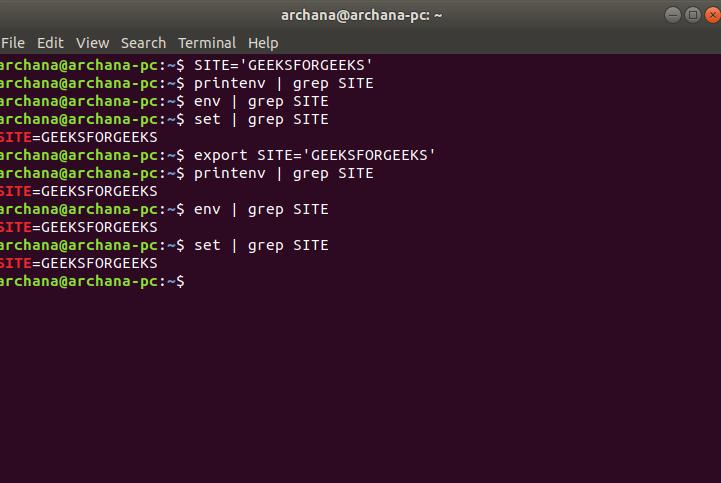Complete List of MS-DOS Commands
1569
30/11/2021

The PATH Variable
After reading this document, you should know what the PATH variableis, how to set it, and how to view the directories currently therein.
Motivation
Consider the following UNIX terminal session:
dbettis@rhino[~]$ ls...
When you type the command
ls
, the shell dutifullyexecutes the command and returns the results to you. During thecourse of a terminal session, you type more commands. These includethings like
emacs
,
firefox
, so on and soforth. But where do these commands come from? Obviously, they'reincluded when you install the operating system, but where are they?
The UNIX command
which
will tell you the full path to abinary it's about to execute. For example:
dbettis@rhino[~]$ which ls/bin/ls
That means that the exectuable for the command
ls
is locatedin
/bin
. Alternatively, to run
ls
, you can type in thefull path to the command:
dbettis@rhino[~]$ /bin/ls...
It seems like there's a bit of magic going on here, however. How doesthe system know that
ls
is in
/bin
? The waythe system knows is the
PATH
environment variable!
Envrionment Variables
First, what's an environment variable? It's a variable that persistsfor the life of a terminal session. Applications running in thatsession access these variables when they need information about theuser. To see a listing of all the environment variables, execute thefollowing:
dbettis@rhino[~]$ exportdeclare -x USER="dbettis"...
The name of variable is
USER
and the contents of thatvariable is
dbettis
. Another way to see the contentsof an environment variable is to do the following:
dbettis@rhino[~]$ echo $USERdbettis
The PATH Environment Variable
The PATH environment variable has a special format. Let's see what itlooks like:
dbettis@rhino[~]$ echo $PATH/usr/local/bin:/bin:/usr/bin:/sbin:/usr/sbin:.
It's essentially a
:
-separated list of directories. Whenyou execute a command, the shell
searches through each of thesedirectories, one by one
, until it finds a directory where theexecutable exists. Remember that we found
ls
in
/bin
, right?
/bin
is the second item in thePATH variable. So let's remove
/bin
from
PATH
. We can do this by using the
expo
rt
command:
how to check path in unix https://t.co/CUBY95j06G
— Rhonda Stevenson Mon Dec 17 19:03:32 +0000 2018
dbettis@rhino[~]$ export PATH=/usr/local/bin:/usr/bin:/sbin:/usr/sbin:.
Make sure that the variable is set correctly:
dbettis@rhino[~]$ echo $PATH/usr/local/bin:/usr/bin:/sbin:/usr/sbin:.
Now, if we try to run
ls
, the shell no longer knows tolook in
/bin
!
dbettis@rhino[~]$ ls-bash: ls: command not found
As expected,
ls
can no longer be found. Let's add
/bin
back to
PATH
, as
ls
is avery useful thing to have.
dbettis@rhino[~]$ export PATH=/usr/local/bin:/bin:/usr/bin:/sbin:/usr/sbin:.
Adding to PATH
There are many times where you'll want to append an item to
PATH
.First, let's see what the current
PATH
is:
dbettis@rhino[~]$ echo $PATH/usr/local/bin:/bin:/usr/bin:/sbin:/usr/sbin:.
The way to
add
a directory is as follows:
dbettis@rhino[~]$ export PATH=$PATH:/new/path
This command adds
/new/path
to
PATH
. Let's see if it got updated:
dbettis@rhino[~]$ echo $PATH/usr/local/bin:/bin:/usr/bin:/sbin:/usr/sbin:.:/new/path
Making this happen every time you login
There's a special file in your home directory called
.bashrc
In UNIX, a convention is that files beginningwith
.
are configuration files, and thus should be hiddenfrom view.
ls
will only list files beginning with a
.
if passed the
-a
flag. e.g.
dbettis@rhino[~]$ ls -a
At any rate, this file (.bashrc), simply contains a list of commands.Each one of these commands gets executed every time you create a newshell.
dbettis@rhino[~]$ cat .bashrcexport PATH="$PATH:/p/firefox/bin"..
Every time a shell is started,
/p/firefox/bin
is addedto
PATH
. If you wish to have certain directoriesautomatically added to
PATH
, simply place those commandsat the end of this file. Log out and log back in to view the changes.Alternatively, you can load the contents of that file in the currentsession:
dbettis@rhino[~]$ . .bashrc
